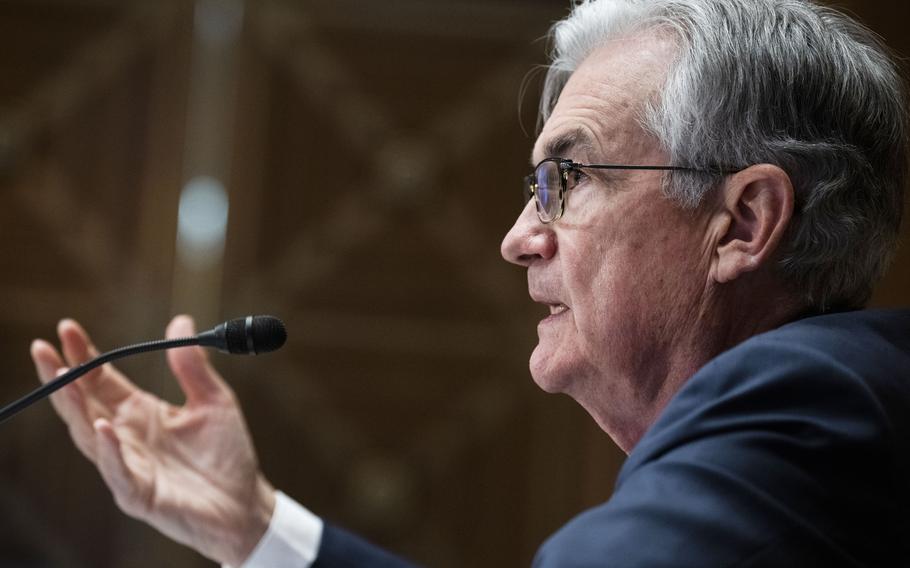
Federal Reserve Chairman Jerome Powell testifies before the Senate Banking Committee hearing, Thursday, March 3, 2022 on Capitol Hill in Washington. (Tom Williams/AP)
Now that’s a truly great divergence. The world’s two economic superpowers dispensed with any significant nuance or qualification regarding their policy course. The U.S. central bank declared war on inflation Wednesday, while Chinese authorities indicated that recession is their foe.
The Federal Reserve not only raised its benchmark interest rate, but projected hikes at all remaining meetings of the Federal Open Market Committee this year, and alluded to quite a few in 2023. Covid-19 has been almost written out of the picture; the rapid pace of price increases is the new villain. Hours earlier, Beijing pledged to boost growth and markets, sending stocks soaring and alleviating concerns the Communist Party was deaf to concerns that the once-impressive recovery was petering out.
The benefits to the global economy from these twin assaults are substantial - if central bank Chair Jay Powell and People’s Bank of China Governor Yi Gang get it right. The Fed wants to tame the most elevated inflation in four decades, something policy makers considered months ago to be “transitory.” China’s lauded bounce from an economic contraction early in the pandemic is being undercut by new crackdowns on covid outbreaks. Morgan Stanley predicts no growth in China this quarter.
Both economies are aiming for softness through dramatic shifts in word and deed. Powell is trying to engineer a gentle landing for the U.S., one that wrings inflation without clubbing the expansion. Central bankers the world over talk about this, but rarely succeed. More common is that rate hikes are left too late and authorities then overdo it, taking the economy down.
China is trying to stave off an economic and financial winter. It’s not very long ago that officials fretted publicly about debt and the need to rein in industries from technology to private tuition that were seen as falling foul of President Xi Jinping. Private sector analysts were forecasting a relatively mild easing of monetary and fiscal policy. Can that really be the case now? Until recently, one lesson China internalized from massive stimulus during the financial crisis of 2008 is that industries can become too leveraged and threaten the system. That is still a legitimate concern.
It’s worth asking how long these stances can be sustained. The Fed’s projections take the main interest rate beyond estimates of “neutral,” a nirvana-like place where borrowing costs neither hamper nor juice the economy. It’s clearly prepared to stray into difficult terrain. Powell dismissed the chances of a recession. The economy may look robust - too much so - today. But with energy prices climbing dramatically after Russia’s invasion of Ukraine and some tightening of financial conditions, it’s a bold call that such vigor will be continued. Most American slumps aren’t declared until many months after they have arrived, by which point it’s too late.
In another sign of a new era at the Fed, covid has been kicked into the long grass. For the better part of two years, Powell has been saying that the course of the economy is dependent on the virus, language often placed very high in Fed communications, verbal and written. Not any more. For Washington, the pandemic is yesterday’s story. Not so for China, where big urban centers are locked down, disrupting companies from Shanghai to Shenzhen.
Same day, different priorities. It could be promising for the global economy, provided neither overreaches.
Daniel Moss is a Bloomberg Opinion columnist covering Asian economies. Previously he was executive editor of Bloomberg News for global economics, and has led teams in Asia, Europe and North America.